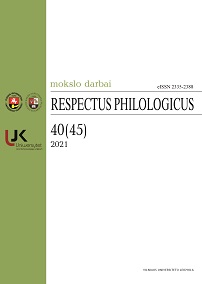Lietuvių kalbos žargono priesaginiai būdvardžiai ir subūdvardėję dalyviai
Suffixal Adjectives and Adjectival Participles in the Slang of Lithuanian Language
Author(s): Robertas KudirkaSubject(s): Morphology, Comparative Linguistics, Baltic Languages, Stylistics
Published by: Vilniaus Universiteto Leidykla
Keywords: adjectives; adjectival participles; slang; affixal adaptation;
Summary/Abstract: The article analyses 197 suffixal hybrid adjectives and 34 adjectival participles from the Lithuanian slang and non-standard dictionary. The study reveals that borrows with affixal adaptation are adapted to the language system, and the adaptive features are determined by regularities: hybrids replicate word-formation models from the Standard Lithuanian language. It was found that the most common suffix of affixal adaptation of borrowings from English is the suffix -inis. Distribution of hybrids with the suffix -iškas is different: almost twice less English originated hybrid adjectives with this suffix than Slavic languages. Adjectival passive participants are most commonly used in Lithuanian slang. Passive participles are the most likely to adjectivize, and there are only few adjectivized active participles in Lithuanian slang. Adjectivized passive participles usually have a negative figurative meaning or are used as substitutes for vulgarisms.
Journal: Respectus Philologicus
- Issue Year: 2021
- Issue No: 40 (45)
- Page Range: 35-47
- Page Count: 13
- Language: Lithuanian

